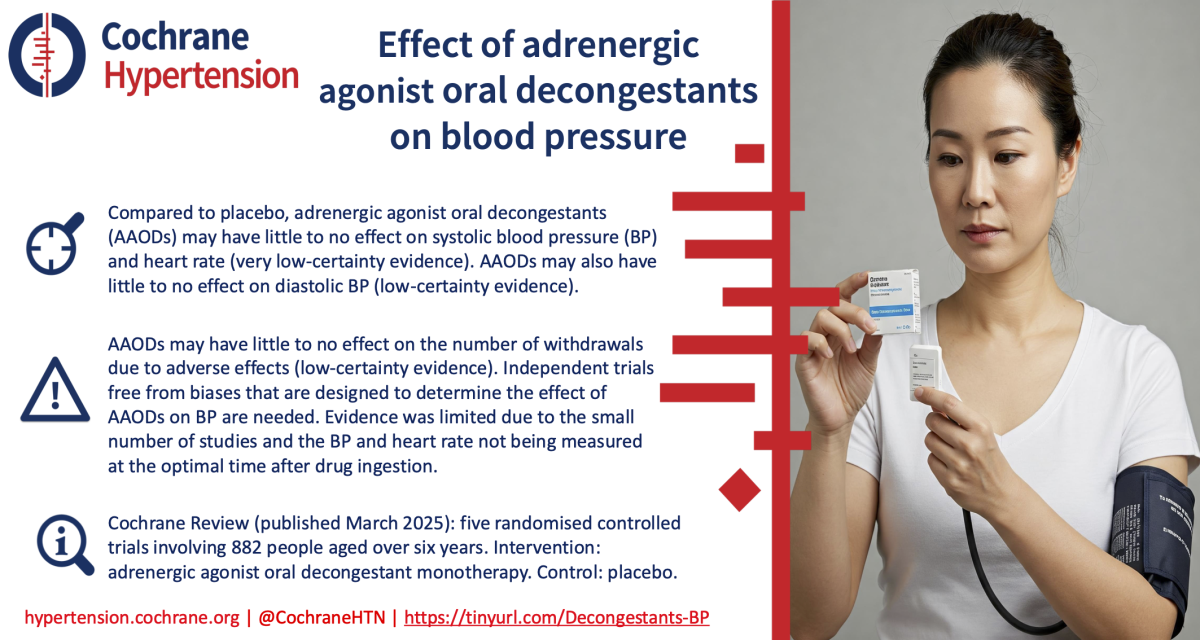
Key messages
- We found no evidence that taking oral decongestants (medicine taken by mouth to relieve a stuffy nose) daily for a week or more changes blood pressure or heart rate or causes people to stop taking them due to unwanted effects.
- There were only a few studies, and they were not well designed. More well‐conducted studies are needed.
- Given that oral decongestants are sometimes taken daily for weeks or months, and have the potential to increase blood pressure, people should consider this potential risk alongside the limited evidence from this review when deciding whether to use these medicines.
What are oral decongestants?
Oral decongestants are medications taken by mouth to relieve nasal congestion (stuffy or blocked nose), often caused by colds, allergies, or sinus infections (small, empty spaces behind the cheekbones and forehead that are connected to the nose). They typically include medicines called pseudoephedrine or phenylephrine.
How do oral decongestants work?
These medicines shrink swollen blood vessels in the nasal passages. This reduces swelling and allows air to flow more freely, helping you breathe easier.
What is hypertension?
Hypertension (high blood pressure) is when resting blood pressure is consistently above 140/90 mmHg. It can lead to unwanted effects such as stroke (where the blood supply to parts of the brain is reduced or stopped) and heart attack (where the blood supply to the heart is reduced or stopped). Lowering blood pressure is the easiest way to reduce these diseases.
How is hypertension treated?
Treating hypertension involves lifestyle measures and taking blood pressure‐lowering medicines. Here, we focused on the effects of daily intake of oral decongestants. While these medicines help with nasal congestion, they may also increase blood pressure.
What do we want to find out?
We wanted to find out whether long‐term use of oral decongestants (for seven days or longer) increases blood pressure and has any unwanted effects. We also evaluated their effectiveness in relieving nasal congestion. This provides essential insights into their benefits and risks to guide informed use.
What did we do?
We searched for studies that compared the blood pressure effects of oral decongestants with placebo. A placebo is a substance or treatment with no active ingredients that is used in medical research to compare against the effects of real medications. We then compared and summarized the results, and rated our confidence in the evidence depending on the study design and methods.
What did we find?
We found five studies involving 882 children and adults (326 males and 591 females). The shortest study lasted one week, with the longest study lasting 24 weeks. These studies measured blood pressure and heart rate after one to seven weeks of taking oral decongestants. The size of the studies ranged from 18 to 568 people, and most were done in the USA. Pharmaceutical companies funded three studies.
We found no clear evidence that taking oral decongestants daily changes blood pressure or heart rate, or causes people to stop taking them due to unwanted effects.
What are the limitations of the evidence?
There was a limited number of studies, and they were not well designed. None of the studies were primarily designed to assess the long‐term effects of oral decongestants on blood pressure. Trials designed to answer this question are needed.
How up to date is the evidence?
The evidence is up to date to July 2024.
Read the review: Efecto de los descongestivos orales agonistas adrenérgicos sobre la presión arterial
Chan JJ, Chan M, Wright JM. Effect of adrenergic agonist oral decongestants on blood pressure. Cochrane Database of Systematic Reviews 2025, Issue 3. Art. No.: CD007895. DOI: 10.1002/14651858.CD007895.pub3
